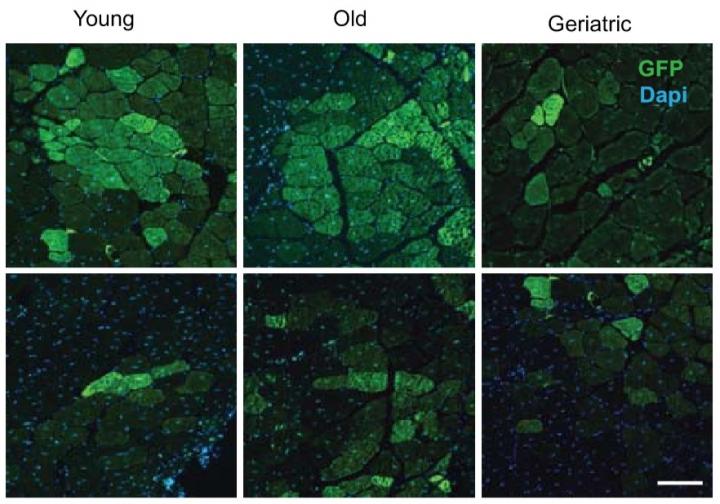The finding provides a basis for

Credit: UPF and CNIC
Researchers at UPF, the National Centre for Cardiovascular Research, ICREA and Ciberned have identified a physiological mechanism that maintains the regenerative capacity of muscle stem cells, and surprisingly resists the passage of time far more than expected, until geriatric age. This study presents the results of more than seven years of research and collaborations with several laboratories in Europe and the US.
Skeletal muscle regeneration depends on a muscle stem cell population (satellite cells) in a dormant or quiescent state, a situation that can be triggered by damage or stress to form new muscle fibres and expand in new stem cells.
The regenerative functions of these stem cells are known to decline with ageing. Dr. Pura Muñoz-Cánoves, the ICREA professor who leads the Cell Biology research group of the Department of Experimental and Health Sciences (DCEXS) at Pompeu Fabra University (UPF) in Barcelona, and head of the Tissue Regeneration Group of the National Centre for Cardiovascular Research (CNIC) in Madrid, and of Ciberned, and colleagues, have found in experiments with mice that all muscle stem cells, despite being quiescent, are not equal, and have identified a subgroup that maintains its regenerative capacity over time, declining only at geriatric age.
The researchers have shown that this subgroup of quiescent stem cells has a greater regenerative capacity through the activation of the FoxO signalling pathway (previously associated with longevity), which maintains the expression of a youthful gene programme throughout life; however, at geriatric age, FoxO activation in this subgroup of cells is lost, causing their loss of functionality.
According to the results presented in Nature Cell Biology, compounds that activate FoxO may have a rejuvenating effect on aged muscle stem cells, opening the way to improve the health of elderly people who are debilitated by the loss of muscle mass. It may also be useful for persons who have lost muscle mass as a result of neuromuscular diseases or effects associated with cancer or infectious or inflammatory diseases.
###
This scientific study has also involved the collaboration of researchers at the National Health Institute (USA), the University of Luxembourg, CIC bioGUNE, CSIC, the University of Pádua and the Sapienza University of Rome. The study was funded in part by grants from the European Research Council (ERC), the Spanish Ministry of Science and Innovation, and La Caixa-Health.
Reference work:
Laura Garci?a-Prat et al. “FoxO maintains a genuine muscle stem-cell quiescent state until geriatric age”. Nature Cell Biology, 2020 (26 October). DOI 10.1038/s41556-020-00593-7.
Media Contact
Mari Carmen Cebrián
[email protected]
Original Source
https:/
Related Journal Article
http://dx.




